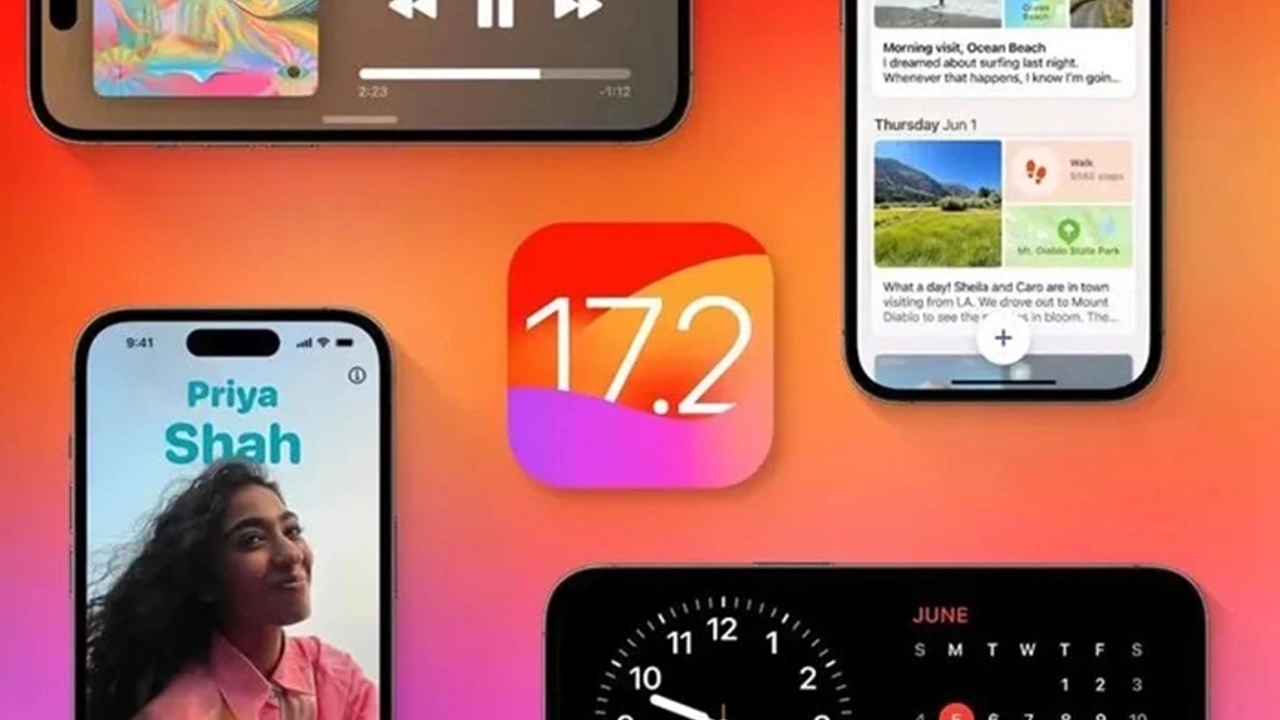Swiss-based PrivadoVPN is a relative newcomer to the VPN scene. It has gained renown thanks to its generous free version, but the company is hoping its premium version will appeal to an even wider audience.
With a privacy-friendly location, strong app support, and ever-growing feature set, it hits all of the right notes on paper. So how does this modern VPN stack up in reality? I put it to the test to find out.
PrivadoVPN VPN in brief:
- P2P allowed: Yes
- Simultaneous device connections: 10
- Business location: Switzerland
- Number of servers: 300+
- Number of country locations: 49
- Cost: $10.99 per month, $35.88 for one year, or $47.76 for two years
What are PrivadoVPN’s features and services?
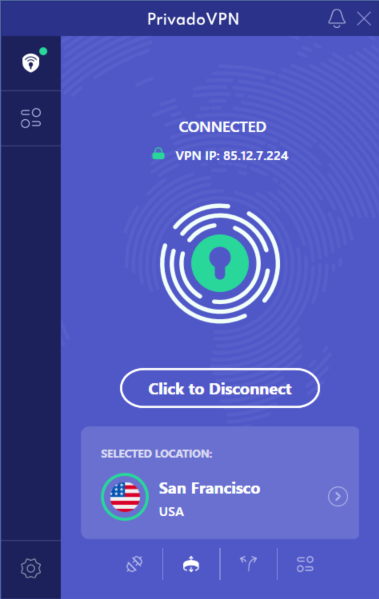
Sam Singleton
When you first open up PrivadoVPN’s Windows app you encounter a really sleek and modern interface. I remember reading forums where early versions of the app were panned due to issues about its awkward navigation and small text. That’s not the case now. The company seems to have listened and completely overhauled the user interface a year or so ago. Now the app is intuitive and easy to get around. I personally think that it’s one of the better VPN interfaces of any major service on the market.
The home screen has a simple connect button with your chosen server below. Information about your location and current IP address are also displayed here. It’s all colored in a pleasant purple with a stylish keylock design.
Along the bottom you have quick-access buttons for a kill switch, VPN protocol, split tunneling, and its ad- and tracker-blocking feature called “Control Tower” — which is oddly also given a second quick-access button on the sidebar.
The VPN comes with both an overall kill switch as well as an app-based kill switch in case you prefer to only block access to specific programs should the connection cut-out unexpectedly.
Protocol support is solid too, with options for WireGuard, OpenVPN, and IKEv2 across all servers.
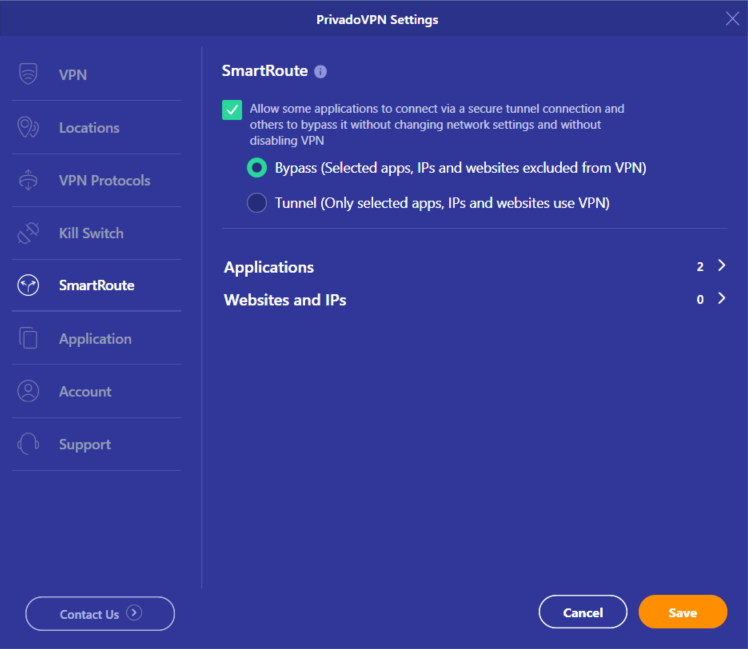
The split-tunneling feature called “SmartRoute,” offers both opt-in and opt-out support options so you can either choose which apps or websites you wish to exclude from the VPN, or if you instead prefer, to keep everything separate from the VPN except the chosen apps.
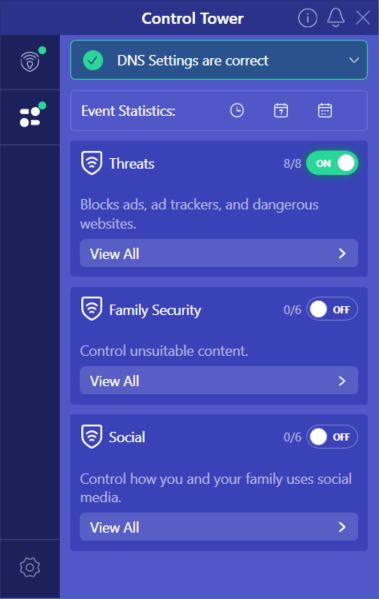
The “Control Tower” ad- and tracker-blocking feature is pretty straightforward with nothing that any of the competitors aren’t already doing. You obviously have the option to block ads and trackers, but you can also turn on parental controls for adult content and even social media sites here as well. The premium service also comes with the option for an antivirus if you’re willing to pay an extra $2 per month.
Clicking the settings wheel on the sidebar opens up a separate window with more options. Here you have access to all of the above features as well as things such as auto connect, interface, account, and support settings. Additionally, you have a “Locations” tab to control how the VPN will determine the best location recommendations — either via physical distance to your home IP address, or through ping tests with its server network.
The feature set that comes with PrivadoVPN is, honestly, quite decent. Split-tunneling and strong kill-switch functionality are more than enough for most people. It does lack some features that the very best VPNs provide though. Noticeably, PrivadoVPN does not have multi-hop servers nor does it have customizable DNS settings.
PrivadoVPN does offer 24/7 support to troubleshoot problems with live chat and email available. The self-help section on its website is pretty good, and from what I’ve been told Privado has extensively updated it recently to better support customers.
The service does provide support for a good range of platforms including Windows, macOS, Android, iOS, Amazon Fire TV stick, Android TV, and some home routers.
How much does PrivadoVPN VPN cost?
PrivadoVPN offers month-to-month, 1-year, and 2-year subscription plans. If you opt for the monthly plan, you’ll need to cough up $10.99 per month. That is on the high-end for VPNs and considering that top competitors offer similar feature sets and more robust server networks means that there might be better value to be found elsewhere.
When it comes to the service’s long-term plans, the value appears much better. The 1-year plan will set you back $35.88 or $2.99 per month. The 2-year plan is even more affordable at $47.76 or $1.99 per month. Both long-term plans throw in an additional three free months when you sign-up.
PrivadoVPN also offers an excellent free plan. With the free plan you’ll have access to 13 global servers and unlimited speeds up to 10GB per month. It allows the same 10 simultaneous device-connection limit and access on all of the same platforms. Plus, even the free servers are able to unblock streaming content — just be aware that if you stream on the free plan, you’ll run up against the 10GB per month speed cap pretty quickly.
How is PrivadoVPN’s performance?
In my testing I measured connection speeds multiple times across PrivadoVPN’s servers in six different countries all around the world and then compared them to my baseline internet speed. PrivadoVPN’s speeds were quite good. Across all locations tested, the average download speeds were 68 percent of the base and the average upload speeds were an even better 79 percent of the base.
That is enough to put PrivadoVPN into the running to make my list of fastest VPNs. The speeds are right up there with the speediest services I’ve ever tested such as NordVPN and ExpressVPN.
For what it’s worth, despite PrivadoVPN touting its super-fast WireGuard speeds, I actually didn’t notice much of a difference in my tests between WireGuard and OpenVPN connections. That being said, WireGuard is usually considered to be the faster of the two and your experience may be different than mine.
The service is more than fast enough to stream, torrent, or game while connected without any issues. Speaking of streaming, PrivadoVPN also scored high marks in unblocking all major streaming services. While connected to its servers I was able to access sites such as Netflix, Amazon Prime, Hulu, and Disney Plus without any issues. That makes PrivadoVPN a good choice if you’re looking to use a VPN to get around region-locked streaming content.
PrivadoVPN’s speeds are right up there with the speediest services I’ve ever tested.
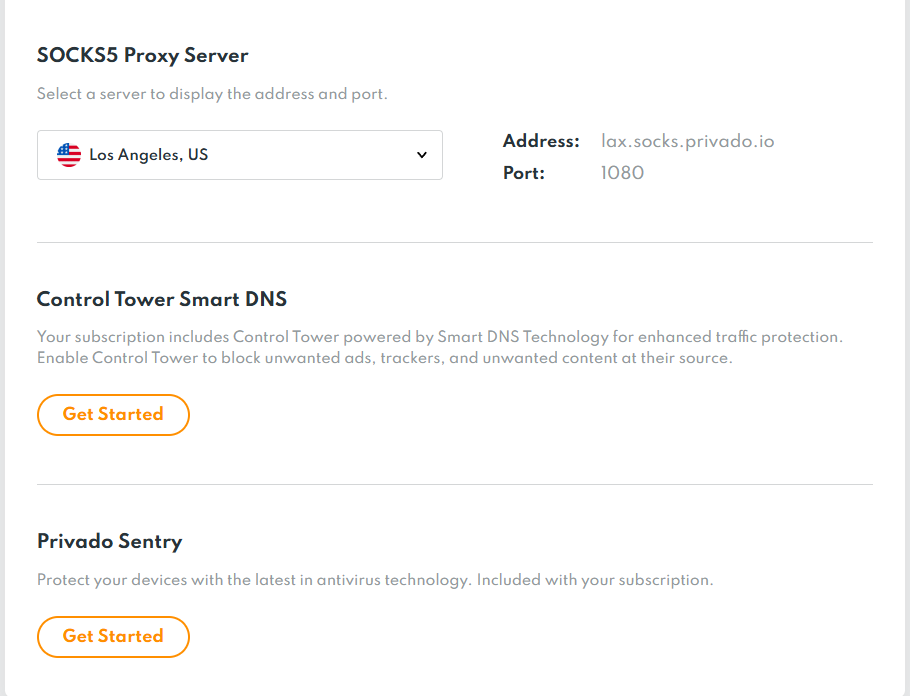
It’s also a decent choice for torrenting due to the aforementioned download speeds and the fact that it offers SOCKS5 proxy to premium users across all servers which may increase your speeds even further.
How is PrivadoVPN’s security and privacy?
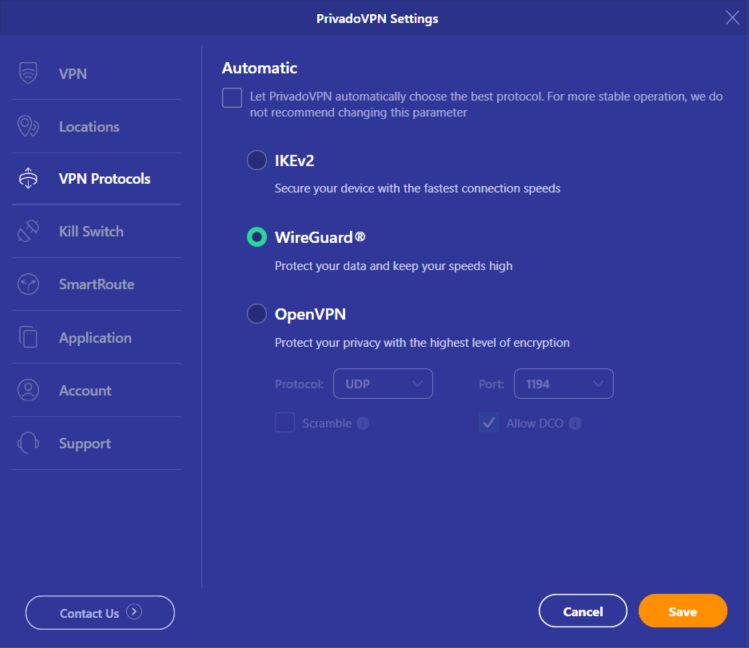
PrivadoVPN uses the industry standard AES-256 encryption and offers access to the WireGuard, OpenVPN, and IKEv2 protocols.
The service is based in Switzerland, a country that has some of the strongest data privacy laws in the world. Also, Switzerland is not a member of the Five Eyes, Nine Eyes, or Fourteen Eyes data sharing alliances. This means that the government and companies located in the country are under no obligation to share user data with governmental authorities in other countries.
PrivadoVPN does claim to be a no-logs VPN in its privacy policy. However, the company has never undergone a third-party independent audit, so you’ll just have to take it at its word. In addition, PrivadoVPN operates off of traditional servers rather than diskless RAM-only servers, which is a bit disappointing. RAM-only servers are more privacy-friendly as any data stored on them is wiped during each server restart.
That being said, the company states that it does not log any sensitive or personally identifiable data such as browsing history or IP addresses. It does, however, collect some data including connected-device information to maintain its 10-device limit, individual bandwidth usage to enforce its 10GB speed limit on its free service, and anonymous crash reports.
While using PrivadoVPN I tested both its kill switch and DNS leak protection. The kill switch worked flawlessly both with the Windows and Android app, blocking my internet access as soon as my connection was severed. DNS leak tests were also successful, showing that my home IP address was never accidentally exposed while connected.
I feel that PrivadoVPN is a trustworthy and private VPN, but I’d like to see it undergo an independent audit and I hope that it makes the switch to diskless RAM-only servers in the future.
Is PrivadoVPN worth it?
PrivadoVPN may be the new kid on the block, but it comes packing a serious punch. With good average speeds, a solid feature set, and excellent streaming service compatibility it has just about everything the average user could want from a VPN. Where it really shines though is the free version, which comes with nearly everything from the premium version without too many of the other drawbacks that other free VPNs hit you with.
Admittedly, its server network is still pretty small and the lack of an independent audit is an issue. But I find it reassuring to know that the company is based in privacy-friendly Switzerland and I would imagine the server network will continue to grow in the future. Overall, it’s a good VPN service, but I’d recommend first trying out the free version to see if it’s right for you before committing to any paid plan.
Editor’s note: Because online services are often iterative, gaining new features and performance improvements over time, this review is subject to change in order to accurately reflect the current state of the service. Any changes to text or our final review verdict will be noted at the top of this article.



